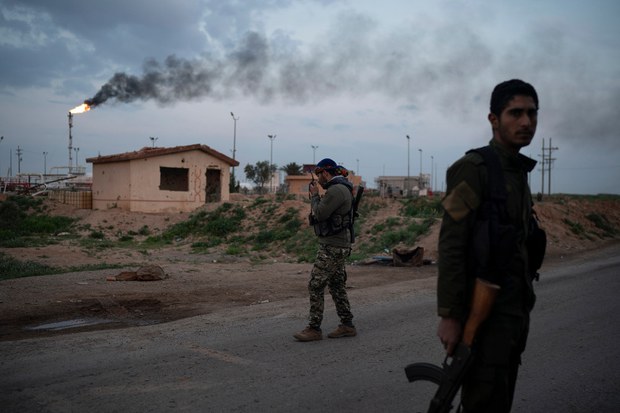Police Official: Some Malaysians Still Hope to Join IS in Mid-East
2019.02.25
Kuala Lumpur
 A U.S.-backed Syrian Democratic Forces (SDF) fighter talks on the radio at a checkpoint near Omar oil field base, not far from a village where an estimated 300 Islamic State militants are besieged, Feb. 24, 2019.
A U.S.-backed Syrian Democratic Forces (SDF) fighter talks on the radio at a checkpoint near Omar oil field base, not far from a village where an estimated 300 Islamic State militants are besieged, Feb. 24, 2019.
Even as Islamic State finds itself cornered in its last redoubt in Syria and has all but crumbled, Malaysians are still thinking about traveling to the so-called “caliphate” to fight for the extremist group, according to Malaysia’s top counterterrorist official.
As many as 102 Malaysians have ventured to Syria and Iraq since 2013 in hopes of joining Islamic State (IS), but 40 have been killed in combat or other circumstances, including nine in suicide bombings, and 11 have since returned home, Malaysian police officials said.
“There are people who are still influenced by IS propaganda … and they plan to go to Syria. However, due to the difficulties in entering into Syria, their plans were blocked,” Ayob Khan Mydin Pitchay, who heads the counterterrorist division of Special Branch, told BenarNews. Special Branch is the intelligence arm of the Royal Malaysian Police.
At the same time, 51 Malaysians including 17 children, still remain in the Middle East but six are trying to come home, he said in an interview conducted via WhatsApp.
The 51 are concentrated around Deir ez-Zor, the largest city in eastern Syria.
“Following defeat after defeat of IS, this group (of Malaysians) has broken into small groups. At this point, the information that we have are that several Malaysians are holed up around Deir ez-Zor,” Ayob told Benar.
The Malaysian children left in Syria range in age from 7 months to 10 years old, he said.
“We have information they have undergone para-military training. For sure, their thinking will be different from other children as they grew up in a war-torn country,” Ayob said, adding that Malaysian police possessed the latest photos of some of these children.
Meanwhile, Malaysians are also now training their sights on joining pro-IS militants on Mindanao, the largest island in the southern Philippines, Ayob warned.
“The possibility of them (IS supporters) moving to neighboring countries like Mindanao is very high, to join groups with ties to Daesh like the Maute Group and the Abu Sayyaf, Group (ASG),” said Ayob, referring to IS by its Arabic name.
In May 2017, pro-IS militants from the Maute Group and ASG seized the southern Philippine city of Marawi, provoking a five-month battle with government forces that destroyed the city in forcing the extremists out.
![190225-MY-Ayob-inside-620.jpg Ayob Khan Mydin Pitchay, the chief of the Malaysian police’s counterterrorist wing, is seen in his office at Special Branch headquarters in Kuala Lumpur, Dec. 2017. [Amy Chew/BenarNews]](/english/news/malaysian/Islamic-State-Malaysians-02252019170831.html/190225-MY-Ayob-inside-620.jpg/@@images/21bde6c2-d0c5-4d9a-bbb0-168e97a1db69.jpeg)
What to do with returnees
Among the 11 who have already come back to Malaysia, eight were charged, convicted and jailed, Ayob said.
As the debate rages in the West over what to do with foreign fighters stuck in the Middle East, Malaysia has accepted all its citizens who returned.
According to Ayob, returnees are not automatically jailed, and each of them is assessed individually.
“The police will evaluate their involvement (with IS) on a case-by-case basis and action will be taken accordingly,” Ayob said.
“If they are not arrested, they will still need to undergo a de-radicalization program that is run by us before they are released back into society. Apart from that, we will continue to keep contact with them (returnees),” the senior police official said.
IS cells remain serious threat
While Islamic State’s physical caliphate is in its final throes, according to media reports out of Syria, the group’s ideology remains a potent and dangerous force in Malaysia, the counterterrorist police chief warned.
“The biggest threat for Malaysia comes from IS small cells … which we continue to monitor,” Ayob told Benar.
From 2013 till February 2019, Malaysian police foiled 24 terrorist plots and arrested 457 suspected militants, including 131 from 21 countries, he said. Of those arrested, 200 were charged in court where 175 were convicted and jailed. Another 123 were released.
However, a grenade attack that injured eight patrons at a Kuala Lumpur area night club in July 2016 was claimed by Islamic State as its first terrorist act on Malaysian soil.
Among the foreigners who were taken into custody since 2013, the largest contingent of 47 came from the Philippines, according to Ayob.
“The conflict in Mindanao will have an impact here. Since 2017, E8 arrested 37 Abu Sayyaf members in Sabah where they were hiding from Philippine security forces who were hunting them,” Ayob said, referring to the Special Branch’s counter-terrorism unit and the east Malaysia state of Sabah, which lies close to the southern Philippines.
“Given the geography, where Sabah can connect the southern Philippines with Indonesia, Filipino foreign fighters will (continue) to make Malaysia a destination to take shelter and hide,” he added. “It will not be surprising if this figure (Filipino foreign fighter) will increase in 2019.”







